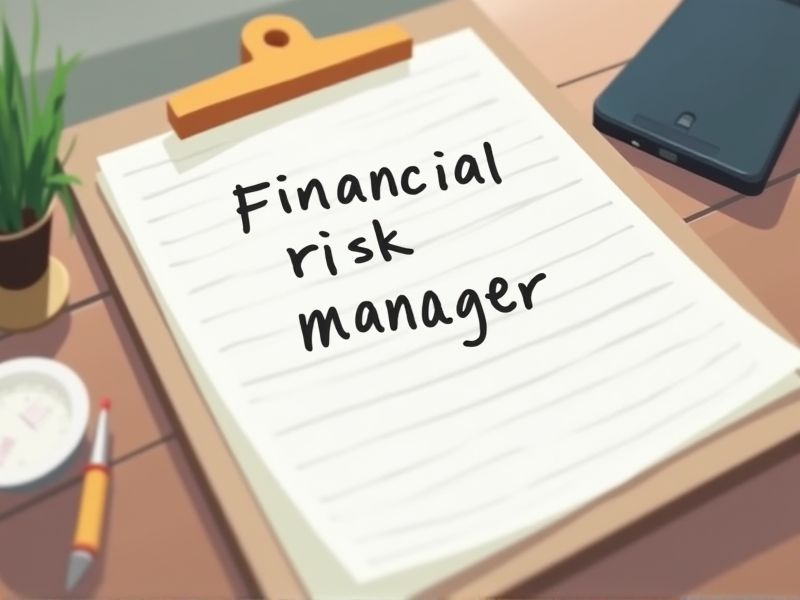
Financial risk managers play a crucial role in navigating the complexities of financial markets, necessitating a deep understanding of risk assessment strategies and tools. Certain certifications provide standardized knowledge, ensuring that these professionals are equipped to handle diverse financial scenarios efficiently. Employers often seek certification as a testament to a risk manager's expertise, credibility, and commitment to continuous learning. Below are some important certifications you may need as a financial risk manager.
Financial Risk Manager (FRM)
Financial institutions face complex risks such as credit, operational, and market uncertainties. A Financial Risk Manager (FRM) identifies, assesses, and mitigates these risks, ensuring stability and compliance. Robust risk management strategies can prevent potential financial losses and regulatory breaches. An FRM's expertise enhances decision-making processes, fostering sustainable growth and resilience.
Professional Risk Manager (PRM)
The need for a Professional Risk Manager (PRM) arises from the complex dynamics inherent in today's financial systems, which require specialized knowledge to manage potential losses and safeguard assets. The rapidly evolving regulatory environment demands that financial institutions stay compliant with international standards, a task made more manageable by PRMs who possess specific expertise in regulatory frameworks. Technological advancements and innovations in financial instruments have rendered traditional risk management approaches inadequate, creating a demand for professionals adept at navigating and mitigating these modern challenges. A PRM's strategic insights contribute to more robust decision-making processes, thus enhancing organizational resilience against financial uncertainties.
Chartered Financial Analyst (CFA)
The Chartered Financial Analyst (CFA) designation equips financial risk managers with advanced analytical skills necessary to evaluate and interpret complex financial data. CFA training enhances proficiency in investment management and valuation principles, crucial for identifying potential risks in financial portfolios. Knowledge from the CFA program aids in the development of strategic risk management frameworks aligned with global financial standards. Risk managers with CFA credentials often gain credibility and trust, making them valuable assets in advising stakeholders on mitigating financial uncertainties effectively.
Certified in Risk and Information Systems Control (CRISC)
Financial risk managers need a deep understanding of IT risk, and CRISC certification equips professionals with the skills to identify and assess such risks effectively. The certification ensures that risk managers are proficient in designing and implementing risk response strategies, crucial for maintaining financial stability. CRISC-certified individuals bring credibility and reliability, reducing the likelihood of technology-related failures impacting financial operations. With the increasing complexity of financial systems, CRISC certification enables managers to stay ahead of emerging IT risks.
Certified Treasury Professional (CTP)
A Certified Treasury Professional (CTP) demonstrates a solid understanding of corporate liquidity, capital, and risk management essential for a Financial Risk Manager. This certification enhances analytical skills required to assess and mitigate financial risks effectively. Having a CTP credential can increase trust and credibility with stakeholders and improve decision-making processes in treasury-related functions. The CTP designation provides a comprehensive framework and tools that optimize financial strategies and adapt to dynamic market conditions.
Chartered Alternative Investment Analyst (CAIA)
Financial risk managers often deal with complex investment products, where expertise in alternative investments becomes crucial; CAIA provides specialized knowledge in this area. By obtaining the CAIA designation, financial risk managers can enhance their understanding of asset classes like real estate, private equity, and hedge funds, which aids in effective risk assessment. This designation signals a comprehensive grasp of risk management, aligning with the evolving landscapes of global finance and investment strategies. Consequently, CAIA equips financial risk managers to navigate and mitigate potential risks associated with alternative investments efficiently.
Certified Credit Risk Analyst (CCRA)
The Certified Credit Risk Analyst (CCRA) designation is essential for a Financial Risk Manager because it provides specialized expertise in assessing credit risk accurately, which is critical in today's volatile markets. CCRA certification ensures that professionals are equipped with current knowledge of regulatory requirements and risk management strategies, reducing potential financial losses. By understanding advanced credit risk modeling and analytics, CCRAs can offer insights that improve risk assessment processes and decision-making in financial institutions. The certification also enhances credibility and demonstrates a commitment to maintaining high professional standards in financial risk management.
Certified Risk Management Professional (CRMP)
Financial institutions face complex risks that require specialized knowledge; the CRMP certification provides professionals with advanced risk analysis skills. Obtaining the CRMP demonstrates a commitment to best practices and continually evolving risk strategies, enhancing a manager's credibility. The certification covers crucial areas such as regulatory compliance and risk mitigation, essential for protecting financial assets. Banks and investment firms prioritize hiring CRMP-certified managers to ensure they have the expertise to safeguard against potential financial crises.
Financial Modelling & Valuation Analyst (FMVA)
Financial risk managers need comprehensive financial models to anticipate potential risks effectively, and the FMVA training enhances these skills. FMVA equips professionals with the ability to interpret complex financial data accurately, aiding in risk evaluation. Enhanced valuation skills from the FMVA program help risk managers in making informed decisions regarding investment risks. The FMVA certification provides tools for risk assessment, crucial for devising strategic risk mitigation plans.
Certificate in Quantitative Finance (CQF)
The Certificate in Quantitative Finance provides financial risk managers with advanced analytical skills, enhancing their ability to model and mitigate complex financial risks. As financial markets grow more intricate, the quantitative tools learned in the CQF become essential for developing effective risk management strategies. This program equips professionals with the knowledge needed to navigate and respond to volatile market conditions. Achieving a CQF distinguishes risk managers as highly qualified within the competitive finance industry.
Summary
When you, as a financial risk manager, earn certifications, your expertise becomes more credible and recognized in the industry. Enhanced skills from accredited programs can boost your decision-making accuracy and efficiency. Employers are likely to perceive you as a valuable asset, potentially leading to career advancement and higher salary prospects. Consequently, your ability to manage and mitigate financial risks increases, benefiting your professional standing and the organizations you serve.
